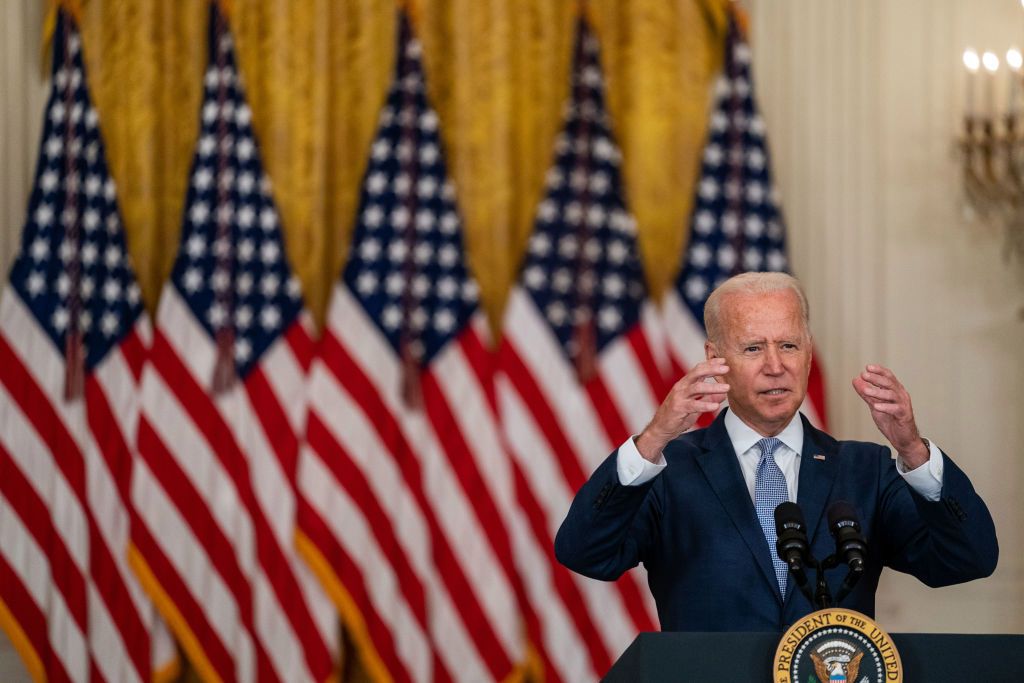Biden Administration Prioritizing Black Outreach In Push for Build Back Better Agenda
Source: Kent Nishimura / Getty
In his latest push, President Joe Biden wants people to believe in the promise of his Build Back Better Agenda. On Wednesday, the president promoted the plan highlighting benefits like free community college, reduced prescription costs, and the child tax credit.
A mix of programs, Biden’s Build Back Better Agenda covers a wide range of investments thought to uplift everyone across the board. According to the president, his plan is more expansive than the bipartisan infrastructure agreement making its way through Congress, with something for everyone.
The administration released a new explainer Friday, breaking down the direct benefit for Black communities. White House Senior Advisor for Public Engagement Trey Baker says his job is making sure Black people understand how the proposal could improve their lives.
The basic premise seems to be that if the current system negatively impacts many Black people, the investments will directly impact and hopefully change for the better.
“We’re going to have to make sure that whether it’s housing or health care, that we put a focus on our outreach on this and make sure that our community understands what’s in it for them,” Baker told NewsOne.
While few provisions are specifically targeted to support Black communities, Baker says the benefit is undeniable. Baker pointed to the Child Tax Credit as an example of a provision that proves a game-changer for Black families.
The second month of payments began hitting people’s accounts on Friday just in time for back to school in many places. The Biden administration estimates the monthly payments would cut the Black poverty rate by at least 34 percent.
Workers without children who are otherwise eligible for the earned income tax credit are expected to see an increase in the benefit. Other benefits include making way for an estimated 360,000 Black people to save on health insurance premiums. A new provision that would expand Medicaid could allow 328,000 uninsured Black people to get insurance.
But systems riddled with racial inequities will inevitably reproduce those issues without direct intervention. Baker said an important part of his work is ensuring Black communities reap the benefits of the proposals and connecting people with the resources.
“Many times, we don’t get the benefit because we don’t have the information,” said Baker. “And so that’s part of my job, making sure that people have the information.”
Baker explained that getting out the information of new programs and funding opportunities is building relationships with service providers, community organizations, and local governments. This becomes particularly important in new funds aimed at creating more affordable housing and expanding employment opportunities.
“Whether it’s partnerships with the National Urban League, NAACP, or others, we try to make sure that the widest swath of our folks knows about it,” shared Baker.
He estimated up to 300 people join his weekly stakeholder calls.
Baker also highlighted the historic investments made in HBCUs. But noted the potential impact for Black students at predominantly white institutions through investments in STEM programs and other initiatives along with increases in Pell grant awards.
The Wall Street Journal recently reported that Black graduates struggle with a larger student loan debt burden than their white counterparts. Instead of closing the wealth gap through higher education, the burden of student loan debt has widened the rift.
Some proponents of student debt forgiveness argue that such an approach would reduce the racial wealth gap. Baker said the issue is still under review, and nothing has been ruled out yet.
Overall, Baker stressed that the administration’s focus on threading equity throughout all of its plans creates a built-in benefit for Black communities with each proposal.
“I think what our community needs to know is that just cause it says infrastructure on one piece — just because it says American families plan — doesn’t mean it’s not specific to them,” Baker concluded. “When you talk about creating jobs for people, cutting folks’ taxes, lowering the cost of healthcare and housing for working families, it’s phenomenal.”
See Also:
Biden Administration Extends Student Loan Pause But Advocates Want It Gone
Rep. Ayanna Pressley Urges President To Act On Student Loan Debt As Biden Considers Executive Action
[ione_media_gallery id=”3819988″ overlay=”true”]

